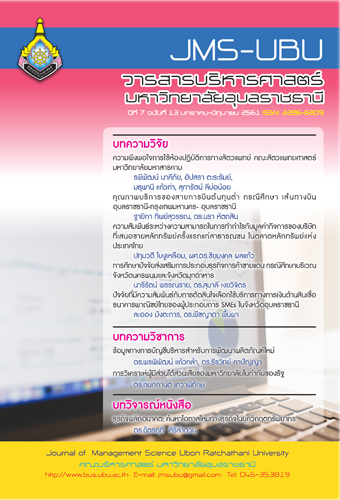ข้อมูลทางการบัญชีบริหารสำหรับการพัฒนาผลิตภัณฑ์ใหม่
Main Article Content
บทคัดย่อ
การพัฒนาผลิตภัณฑ์ใหม่เป็นกระบวนการที่สำคัญในการดำเนินธุรกิจ โดยเป็นกระบวนการที่ประกอบด้วย 5 ขั้นตอน คือการวางแผนกลยุทธ์สำหรับผลิตภัณฑ์ใหม่ การสร้างแนวความคิด การประเมินแนวความคิด การพัฒนาผลิตภัณฑ์ และการนำผลิตภัณฑ์ออกสู่ตลาด ข้อมูลทางการบัญชีบริหารมีความจำเป็นสำหรับการวางแผนทางการเงิน การควบคุมต้นทุน และการประเมินผลการดำเนินงานในการพัฒนาผลิตภัณฑ์ใหม่ อาทิเช่น การจัดทำงบประมาณ การประเมินความเสี่ยงและผลตอบแทน ข้อมูลรายได้และต้นทุน การพยากรณ์กระแสเงินสด และการวิเคราะห์ความสามารถในการทำกำไร เป็นต้น นักบัญชีจึงสามารถสนับสนุนข้อมูลสำหรับการประเมินโอกาสทางธุรกิจหรือหลีกเลี่ยงการผลิตสินค้าที่ไม่สามารถสร้างผลกำไรได้ ดังนั้น การทำงานร่วมกันระหว่างนักบัญชีและทีมพัฒนาผลิตภัณฑ์ใหม่จะทำให้เกิดการแบ่งปันและสื่อสารข้อมูลทางการบัญชีในกระบวนการพัฒนาผลิตภัณฑ์
Downloads
Article Details
บทความที่ตีพิมพ์ในวารสารบริหารศาสตร์ มหาวิทยาลัยอุบลราชธานี เป็นลิขสิทธิ์ของวารสาร โดยเนื้อหาและความคิดเห็นในบทความเป็นความรับผิดชอบของผู้เขียนแต่ละท่าน ไม่เกี่ยวข้องกับคณะบริหารศาสตร์ มหาวิทยาลัยอุบลราชธานีแต่อย่างใด และหากมีข้อผิดพลาดประการใด ผู้เขียนจะเป็นผู้รับผิดชอบต่อบทความของตนเองแต่เพียงผู้เดียว
เอกสารอ้างอิง
Abernethy, M.A. and Bouwens, J. (2005). Determinants of accounting innovation implementation. ABACUS, 41 (3), 217-240.
Ballou, B. and Heitger, D.L. (2008). Kofenya: The role of accounting information in managing the risk of a new business. Issues in Accounting Education, 23 (2), 211-228.
Bisbe, J. and Otley, D. (2004). The effects of the interactive use of management control systems on product innovation. Accounting, Organizations and Society, 29, 709-737.
Bourguignon, A. (2005). Management accounting and value creation: the profit and loss of reification. Critical Perspective on Accounting. 16. 353-389.
Buyukozkan, G and Feyzioglu, O. (2004). A fuzzy-logic based decision making approached for new product development. International Journal of Production Economics, 90 (1), 27-45.
Chenhall, R. and Langfield-Smith, K. (1999). Innovation in management accounting. Australian CPA, 69 (8), 76-78.
Chua, W. F. (2007). Accounting, measuring, reporting and strategizing re-using verbs: A review essay. Accounting, Organizations and Society, 32, 484-494.
Cooper, R.G., Crawford, M. and Benedetto, A.D. (2001). New products management, Seventh Edition. New York: McGraw-Hill.
Crawford, M. and Di Beneditto, A. (2003). New product management, Seventh Edition. New York: McGraw-Hill.
Davila, T. (2000). An empirical study on the drivers of management control systems’ design in new product development. Accounting, Organizations and Society, 25, 383-409.
Davila, A., Foster, G. and Oyon, D. (2009). Accounting and control, entrepreneurship and innovation: Venturing into new research opportunities. European Accounting Review, 18 (2), 281-311.
Davila, A. and Wouters, M. (2004). Designing cost-competitive technology products through cost management. Accounting Horizons, 18 (1), 13-26.
Emsley, D., Nevicky, B. and Harrison, G. (2006). Effect of cognitive style and professional development on the initiation of radical and non-radical management accounting innovations. Accounting and Finance, 46, 243-264.
Ferrante, C.J. (2006). Innovative sharing: shared accounting information as a facilitator of trust and performance. Journal of Engineering and Technology Management, 23, 54-63.
Gosselin, M. (1997). The effect of strategy and organizational structure on the adoption and implementation of activity based accounting. Accounting, Organizations and Society, 22 (2), 105-122.
Hertenstein, J. H., and Platt, M. B., (1998). Why product development teams need management accountants. Management Accounting: Official Magazine of Institute of Management Accountants. 79 (10).
Hertenstein, J. H. and Platt, M. B. (2000). Performance measures and management control in new product development. Accounting Horizons, 14(3), 303-323.
Hope, J. and Fraser, R. (1999). Beyond budgeting: Building a new management model for the information age. Management Accounting, (December), 20-23.
Hughes, P. and Pierce, B. (2006). The accountant’s contribution to new product development. The Irish Accounting Review, 13 (1), 47-68.
Jorgensen, B. and Messner, M. (2009). Accounting and strategizing: A case study from new product development. Accounting, Organizations and Society, 35, 184-204.
Kotler, P. and Keller, K.L. (2006). Marketing management, Twelfth Edition. New Jersey: Pearson Education.
Lev, B. (2000). New accounting for the new economy. Retrieved from www.cs.trinity.edu.
Odgers, J.F. (1988). Accounting for technological innovation: an overview. Technovation, 7, 117-129.
Rabino, S. (2001). The accountant’s contribution to product development teams- a case study. Journal of Engineering and Technology Management, 18, 73-90.
Sandino, T. (2007) Introducing the first management control systems: evidence from the retail sector. The Accounting Review, 82(1), 265-293.
Smith, M. (2008). The diffusion of technological and management accounting innovation: Malaysian evidence. Asian Review of Accounting, 16 (3), 197-218.
Veeken, H. and Woueters. M. (2002). Using accounting information systems by operation managers in a project company. Management Accounting Research, 13, 345-370.

